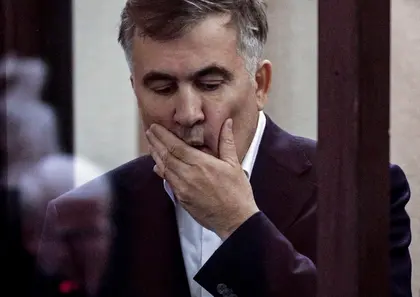Georgia’s jailed ex-president, Mikheil Saakashvili, had been “poisoned” in custody by heavy metals and risks dying without proper treatment, according to a medical report distributed on Monday, Dec. 5, by his legal team.
The 54-year-old was transferred to hospital last year after a hunger strike that he maintained for 50 days to protest at his jailing, which rights groups have denounced as politically motivated.
- Get the latest war in ukraine update from the Kyiv Post's daily news reports published today.
- Look at the latest Ukraine news that was released today.
JOIN US ON TELEGRAM
Follow our coverage of the war on the @Kyivpost_official.
In a report distributed by Saakashvili’s legal team, US-based toxicologist David Smith said “testing has revealed the presence of heavy metals” in Saakashvili’s body and the pathological symptoms he displays “are the result of heavy metal poisoning”.
“To a reasonable degree of medical certainty” the toxic agents, including mercury and arsenic, were introduced after Saakashvili was jailed, Smith said.
The authors of the report, dated November 28, also said Saakashvili was being administered damaging medication without proper oversight.
The “increased risk of mortality is imminent” without adequate treatment, “which appears to have been denied or unavailable” in Georgia, Smith added.
Georgian authorities have insisted that Saakshvili is being given adequate medical care.
Another independent doctor, Mariam Jishkariani, who headed a council of medics which had examined Saakashvili, told AFP on Monday he has been “diagnosed with brain damage and neuro-intoxication”.
“He is suffering from a number of serious illnesses, which are incompatible with his confinement, according to Georgian law.”
Tengiz Tsuladze, a doctor from a council of medics set up by Georgia’s rights ombudsperson, said Saakashvili’s “has lost more than 40 kilogrammes (88 pounds) since his detention”.
“Georgia’s medical system has apparently exhausted all the available means for Saakashvili’s treatment,” he told the independent Formula TV station on Sunday.
Saakashvili, the founder of Georgia’s main opposition force and president of the small Caucasian nation from 2004 to 2013, was convicted in absentia on charges of abuse of office and sentenced to six years in prison in 2018.
The pro-Western reformer was imprisoned in October 2021, days after secretly returning from exile in Ukraine.
He has denounced his conviction as politically motivated.
In October, the Council of Europe rights watchdog called for the “release of political prisoners opposed to (Russian President Vladimir) Putin in the Russian Federation and other countries, including Mikheil Saakashvili”.
Amnesty International has branded his treatment as “apparent political revenge”.
You can also highlight the text and press Ctrl + Enter



